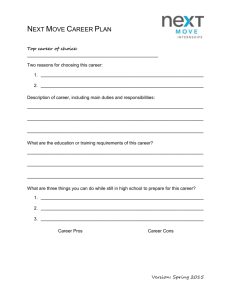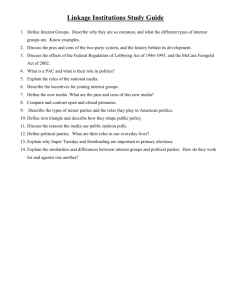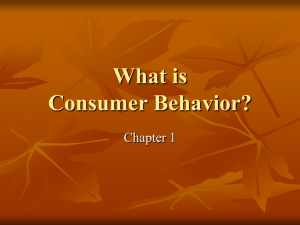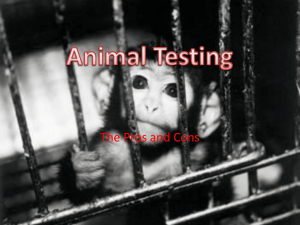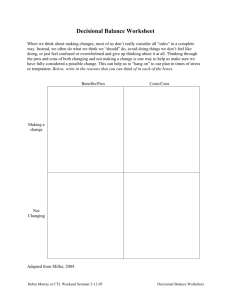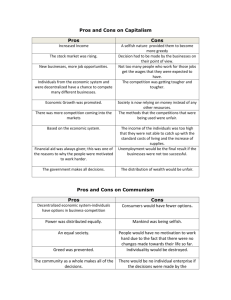EPQ_LESSON_2_-_Project_proposals
advertisement
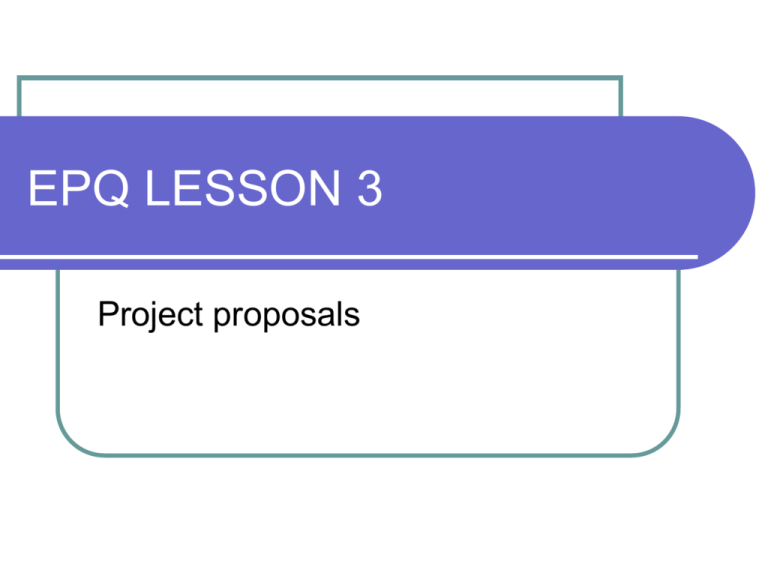
EPQ LESSON 3 Project proposals Learning outcomes Everyone should understand the key ingredients of the PP Some of you will find that you already have a good idea of what to put in your ‘areas of thought’ A few of you could produce your PP right now What is the Project Proposal? Five elements: 1. Title and Objectives 2. Reasons for choosing this project 3. Activities & time scale / milestones 4. Resources 5. Contingencies The title should be … In the form of a question, phrased in such a way as to ensure that the answer – Will be analytical as opposed to description / narrative Involves evaluation and / or judgement Reaches a conclusion based on the evidence Will not be a simple list For example: What happened at breakfast? What did you eat for breakfast? Why did you eat breakfast? ‘Breakfast is the most important meal of the day.’ How far do you agree? A good title Uses the right sort of language: To what extent …? Assess the view that … How important was …? How far …? Is pithy & elegant! Last year’s titles: Water Fluoridation: Poison or Panacea? Deir Yassin – Myth or Massacre? ‘Prison is a £2.2 billion failure.’ To what extent is this true? ‘Powerful evidence of inhumanity to women.’ To what extent is this true of the 1612 Pendle witch trial in Lancashire? ‘Alcohol liver disease patients should not be eligible for liver transplantation.’ Assess this view. A good title reflects a good topic A good topic will be: Narrow enough to research in 2 months Controversial: you need two or more sides to the argument (aka ‘Schools of Thought’) Resource-rich: you need plenty of material to research (but not too much … back to the first point above) Best of all, some of the evidence (or even a whole School of Thought) should be flawed or unreliable or suspect – which makes it easy for you to evaluate 0f deep personal interest to you 2. Reasons for choosing this project Personal interest – Why? Trigger? Future plans? Knowledge you want to increase Why the topic is important (to the world!) Skills you want to learn … 3.Activities & time scale / milestones AVOID the ‘I’ll research everything, then I’ll write it all up in one go’ approach Go for a rhythm with your schedule …. research, write; research, write; research, write Make the rhythm reflect the ‘areas of research’ (see 4ii below) Put together a calendar from now to Feb allowing time for hols, Exams. 4. Resources i. Resources …. Journals, books, museums, people, internet, equipment, podcasts, blah, blah. That bit is easy. ii. The really, really CRUCIAL bit is hidden down at the bottom …. ‘Your areas of research’ = Your research questions ‘Your areas of research’ = your plan in effect = what your contents page will look like BUT phrased as questions at this point in time The better you write this part up now, the easier your job in the summer. For example – see the rhythm Model 1 1. Background – some general information on this debate 2. 3. 4. What is the case for …? 2.1 Reason 1 2.2 Reason 2 2.3 Reason 3 Pros & cons of this Pros & cons of this Pros & cons of this What is the case against …? 3.1 Reason 1 3.2 Reason 2 3.3 Reason 3 Pros & cons of this Pros & cons of this Pros & cons of this Conclusion – based on the evidence and my evaluation of the theories, what are my thoughts? For example – see the rhythm Model 2 1. Background – here’s an outline of the situation … why did it happen / is it happening? 2. School of Thought A, followed by evidence for and against this SoT 3. School of Thought B, followed by evidence for and against this SoT 4. School of Thought C, followed by evidence for and against this SoT 5. Introduce case study (a local study?) 6. Which theory best fits my case study? 7. Conclusion – what do I think on the basis of my case study of the whole situation? Are any of the theories correct? In the next three weeks Devise a model Fill in the blanks (Theory A = ) Talk it through with as many people as possible Write it up Make your calendar reflect the plan Remember – follow the rhythm 5. Contingencies Game What problems might you have? Shout out your worst fear What will you do if this happens? Everyone else – come up with three solutions, please! What does a good PP look like? What does the mark scheme say? Read AO1, Mark Band 3 Use the EPQ mark scheme to help you plan your project. So …? Minimal help reaching the question A clearly focused, well-defined question Clear, concise project plan Thoughtful objectives & rationale Break down of tasks Appropriate time span to each Any questions? Things to do: See your mentor and use email to contact them. They are busy people and this is extra work for them. ( Give gifts) Keep up your Activity Log Join local/school Library Speak to the librarian Mrs Watkins for advice Get logged to school email Get reading and thinking!


